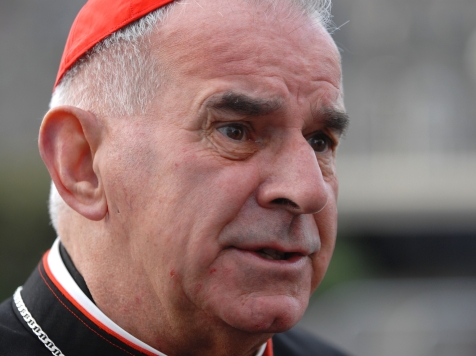
The leader of the Roman Catholic Church in Scotland is stepping down as an archbishop, effective immediately, according to the Scottish Catholic news office. Cardinal Keith O’Brien, the United Kingdom’s most senior Roman Catholic, is resigning following reports of allegations of inappropriate sexual advances toward priests in the 1980’s.
O’Brien, who contests the allegations, submitted his resignation to Pope Benedict months ago, and has stated that he will not participate in the conclave that will choose the next pope, though still eligible to do so.
Regarding his decision, O’Brien said, “I do not wish media attention in Rome to be focused on me.”
On Monday, the president of BishopAccountability.org, praised O’Brien’s decision to recuse himself from the conclave as an important standard of practice in a church that is attempting to develop new precedents in the wake of a sexual abuse scandal.
Terence McKiernan said:
Cardinals who are tainted by the crisis cannot choose the person who will solve it…If they are involved in the deliberations and the votes, they will taint the outcome, damaging the legitimacy of whoever is ultimately chosen.
O’Brien’s decision is in sharp contrast to that of Cardinal Roger Mahony, former archbishop of Los Angeles, who is being sharply criticized for traveling to Rome for the conclave despite new revelations that Mahony worked to prevent law enforcement officials from investigating priests who sexually abused children. Though Mahony apologized for his actions, he has insisted on participating in the conclave that will elect the next pope.
On Saturday, a group known as Catholics United, collected nearly 10,000 signatures on a petition that requests that Mahony refrain from participating in the conclave because of the priest sex abuse scandals that occurred while he was archbishop.
During a deposition on the same day, Mahony responded to questions under oath for nearly four hours about his handling of clergy sex abuse cases.
One case, set for trial in April, concerns a Mexican priest, Nicholas Aguilar Rivera, who allegedly molested at least 26 children during a nine-month stay in Los Angeles. Church files indicate that Rivera fled to Mexico when Thomas Curry, an aide of Mahony, warned him that the children’s parents would likely file complaints with the police, and that he would be in serious trouble. To date, Rivera remains a fugitive in Mexico.
In January, the current archbishop of Los Angeles, Jose H. Gomez, censured Mahony, his predecessor, referring to the documents he released as, “brutal and painful reading,” and announced that he was removing Mahony from administrative and public duties.
Nevertheless, Mahony publicly shot back at Gomez, implying that his censure of him was unwarranted. In his blog, Mahony wrote:
Not once over these past years did you ever raise any questions about our policies, practices or procedures in dealing with the problem of clergy sexual misconduct involving minors.
Mahony, who, during his tenure, was an outspoken champion of immigration rights, has used his blog and Twitter account to continue to defend his decision to participate in the papal conclave.
“Anyone interested in loving your enemies, or doing good to those who persecute you?” he posted on Twitter on Monday. “See my blog for today. Wow, Jesus is demanding.”
On his personal blog, Mahony wrote:
I can’t recall a time such as now when people tend to be so judgmental and even self-righteous, so quick to accuse, judge and condemn. And often with scant real facts and information. Because of news broadcasts now 24/7 there is little or no fact checking; no in-depth analysis; no context or history given. Rather, everything gets reported as ‘news’ regardless of the basis for the item being reported — and passed on by countless other news outlets.
With much media attention on the conclave, Pope Benedict, who will retire on Thursday, has issued a “motu proprio,” a papal document that changes Church law, that clears the way for the College of Cardinals to select a date that is earlier than the 15-day waiting period currently required to elect the pope’s successor.

COMMENTS
Please let us know if you're having issues with commenting.